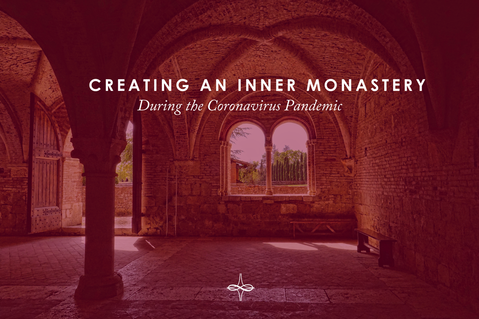|
A month ago, I thought I would be balancing returning back from a service immersion trip and student leadership interviews. Today I sit in my makeshift home office preparing for my next Zoom call, trying to keep in check my own anxieties while still ministering to my students. To be honest, the first week was not easy, and I have still not mastered ministry from home and social distancing. As the days continue, I have progressively realized my need to change my mindset of survival to finding peace, stability, and hope. I went to Thomas Merton and St. Teresa of Avila, my two go to’s when needing to be reminded of where to find God. As I read the words of this Trappist monk and Carmelite nun, it dawned on me that in midst of darkness, fear, and chaos, I have been given an opportunity to create an inner monastery. The lives of these monastic friends of mine shed light on three aspects that I trust and can incorporate into my social distanced day-to-day in order to give me peace and calm my anxieties.
I invite you to share in the wisdom of the monastics and find the opportunity during these challenging times to create within our homes and families an inner monastery. Fears, sickness and hardship won’t be removed, but the insights of our brothers and sisters who have lived this life before us can help us to “recognize the possibilities and challenges offered by the present moment, and to embrace them with courage, faith and hope.” If you find it helpful, here is my Inner Monastery Routine. Finding balance will look different for each person, so take what works for you and make adjustments to fit your needs.
1 Comment
Today we celebrate the feast of St. John Paul II, a saint of our times! He is remembered for many things, including his passion for the arts, outdoors, youth, and families. St. John Paul II also had a deep devotion to Mary, and in what I know of St. John Paul II’s life and loves, we can bring no greater joy in celebrating his sainthood than by honoring our blessed Mother. St. John Paul II’s favorite prayer was the Rosary, and I too, have developed a fondness for praying it. I stumbled upon a recording a couple of years ago in my desire to pray it intentionally. As I would listen and pray along in my car every morning before work, I discovered a love for each mystery and the fruit they bear, as like Mary, I “pondered them in [my] heart” (Luke 2:19, 51). The mysteries of the Rosary invite us to contemplate the life of Christ through the memories of Mary. St. John Paul II says remembering these mysteries “were to be the ‘rosary’ which she recited uninterruptedly throughout her earthly life” (Rosarium Virginis Mariae, §11). In this remembering, the account of the Gospel from the eyes of Mary are timeless, “not only belong[ing] to ‘yesterday’; they are also a part of the ‘today’ of salvation” (John Paul II, Rosarium Virginis Mariae, §13). In this, St. John Paul II reminds us that the Rosary is an invitation to participate in Christ’s divine life, and it is relevant across time to the faithful of all ages. Recently my routine for praying the Rosary has changed as I am now on maternity leave and spend the day taking care of my newborn daughter. Instead of rushing to get my two-year-old son into the car and dropped off at daycare before work and enjoying my prayer time alone in the car, we have the opportunity to hop in the stroller and walk to daycare, spending time together saying hi to neighbors and marveling at the changing of seasons before he starts his school day. Despite the enjoyment both my son and I get from these walks, in the transition of summer at home with mommy to school, and the transition from being an only child to living the realities of being a big brother at only two years old, for quite a few weeks my son was not happy about leaving home for the day. Although my son loves school, he was hating drop off, and his anxiety (and let’s be honest, mine, too) crept in the closer we got to school each day. One morning as I was trying to get him excited for the day, I asked him if he wanted to pray the Rosary with me, telling him it always brings me calm and comfort, and he said yes. I told him I would let my recording play, and I would tell him the stories of each mystery. Thus began a new routine for us each morning. As the Joyful Mysteries play, I tell him about how much Mary loved God that she said yes to being Jesus’ Mommy, and how we pray that we can love God like her and say yes to Him when he needs us to. When the Luminous Mysteries play, I tell him about Jesus’ first miracle, turning water into wine at the Wedding at Cana, and that through Mary, she will lead us to Jesus and help us see the miracles he’s performing in our own lives. In praying the Sorrowful Mysteries, I am very closely brought to tears as I think about explaining death to a toddler, and moved by Jesus’ sacrifice for us, telling my son that no sin stops Christ’s love for us. We pray to be good people and follow the will of God. And when we pray the Glorious Mysteries, I get to teach my son about the glories of the Holy Spirit and Heaven, praying for our ultimate happiness with Jesus, Mary, and all the saints. In praying these, I am in awe of how parenting is transforming my heart, teaching me to be like a little child, loving Jesus without abandon like my son does. By the time we’ve prayed our Rosary for the day, we’ve arrived at daycare. Filled with his spunky confidence and newfound graces, my son hops out of his stroller and says “let me give you a kiss for the road,” and sends me off on my way. Each day, he runs off to the playground to play with his friends, and I am amazed by the graces we’ve both received by praying the Rosary together. In his great love for both the Rosary and the family, St. John Paul II called families to pray this prayer together, acknowledging how its graces unite the family: Individual family members, in turning their eyes towards Jesus, also regain the ability to look one another in the eye, to communicate, to show solidarity, to forgive one another and to see their covenant of love renewed in the Spirit of God. Many of the problems facing contemporary families, especially in economically developed societies, result from their increasing difficulty in communicating. Families seldom manage to come together, and the rare occasions when they do are often taken up with watching television. To return to the recitation of the family Rosary means filling daily life with very different images, images of the mystery of salvation: the image of the Redeemer, the image of his most Blessed Mother. The family that recites the Rosary together reproduces something of the atmosphere of the household of Nazareth: its members place Jesus at the centre, they share his joys and sorrows, they place their needs and their plans in his hands, they draw from him the hope and the strength to go on. (Rosarium Virginis Mariae, §41) From daycare drop-offs to contemplating our family’s deepest sorrows and joys, we too as a family have found this hope and strength of the Rosary to be true and timeless. On this Feast of St. John Paull II, I invite you to honor him and our Blessed Mother by taking the time to pray the Rosary, finding twenty minutes of your time to devote to contemplating the face of Jesus. St. John Paul said, “a prayer so easy and yet so rich truly deserves to be rediscovered by the Christian community… I look to all of you, brothers and sisters of every state of life, to you, Christian families, to you, the sick and elderly, and to you, young people: confidently take up the Rosary once again. Rediscover the Rosary in the light of Scripture, in harmony with the Liturgy, and in the context of your daily lives” (Rosarium Virginis Mariae, §43). Know of my unending prayers for you as you begin this rediscovery of the Rosary for yourself, as with Mary, you too ponder these mysteries in your heart and recognize their fruits in your life. St. John Paul II, pray for us! Our Lady of the Rosary, pray for us! “Jesus bent down and began to write on the ground with his finger.” - John 8:1-11
During this fifth week of Lent we are reminded that Jesus’ calm heart of contemplation should be our guide in strengthening our dependence on Him, allowing us to minister with renewed and clear hearts. As I read today’s Gospel, I was drawn not to his words or the main plot points that unfold, but rather I found my heart gravitate most towards this line: “Jesus bent down and began to write on the ground with his finger.” I’m sure I’m not alone in what comes to mind when I think about the legacy of Jesus: turning water into wine, walking on water, healing the sick...my mind never lands on this action of lowering himself to the ground and drawing in the dirt with his fingers. He stops in his tracks, undoubtedly with everyone around Him holding their breath for His response to the scribes and Pharisees, and he takes the time for discernment, for contemplation. I imagine him allowing the spirit to surround Him and aid Him in this moment of being tested, strengthening Him to release the words of His father: the words of justice and love towards a woman who, like all of us, is more than the worst thing she has ever done. Through contemplation and discernment we are made strong in our God, we are more clearly able to see the path of justice. We are able to withstand the tests and temptations so that we might fix our eyes on seeing God alive in those in front of us. As Lent comes to a close, let’s choose to kneel down and take pauses to invite God in to each moment that we might always minister from a place of contemplation. Focus: Community Can you imagine what our world would look like if we brought more contemplation into our relationships and our communities? If we allowed ourselves to be completely vulnerable and invite others to lean on us the way Jesus invites us into his embrace? To me this sounds a lot like the kingdom we so often talk about. I invite you to reflect on how you can weave contemplation not just into your own personal prayer life, but into your interactions to those you are closest to and still others you can invite into community. Prayer This Lenten season, may we doodle on napkins, choose the longer way home, find a quiet corner in our day, for we believe that when we ponder your mystery, you reveal glimpses to our hearts. May we turn down the radio, set aside the distractions of screens and bright lights, for we trust that in the silence you will speak loudest. May we kneel down to the ground, write with our fingers in the dirt, and allow the spirit room to transform our hearts into cathedrals of more perfect love. Who Inspires You To Serve? To me so much of embracing mission is learning about the local culture and people who have shaped the place God has sent me. Guatemala had arguably one of the most brutal civil wars in the region, lasting 36 years. Amidst the violence, an Indigenous Quiche Mayan woman, Rigoberta Menchú, worked against the brutal Guatemalan government and army on behalf of the rights of Indigenous peoples. Despite losing many family members to the genocidal violence, the Catholic faith being manipulated to tell Indigenous Mayan people to accept their poverty and persecution, and being exiled from her home country, her renewal in liberation theology and the strength of the Lord set her feet on a path of justice to fight for the human dignity of her people. Through continued contemplation, may we all find our hearts moved to not just long for, but to seek justice. This reflection comes from our 2019 Lenten Reflection Guide, a collaborative effort between the Catholic Apostolate Center and Catholic Volunteer Network. Click here to view the entire guide with reflections for each week of the Lenten season. Becky Kreidler, Franciscan Mission Service "Rather than seeing summer as the “down time” at a church, commit to approach the coming months with the intention of fostering experiences of active service, quiet prayer and contemplation, and stimulating intellectual work or professional training." Having worked at a handful of churches, I have observed that the summer is the slowest time of year for parish life. Parishioner’s schedules are all over the place, especially if there are children or teenagers involved, with vacations, camps, etc. During the summer, parish programs tend to slow down (However, some parishes will run a Vacation Bible School, or similar camp-like program). But summer doesn’t have to be a long spiritual nap. In fact, the summer can be a very important time and opportunity for a church, especially for church staff. How you approach the summer can greatly shape the year ahead. Besides the celebration of the Mass, the summer provides a number of unique opportunities for spiritual growth in areas that aren’t always possible throughout the rest of the year. Here are a few opportunities for spiritual growth you might consider for your parish. Parish Mission Trips Many parishes host mission trips—whether local, national, or international. Consider prioritizing mission trips and extending the opportunities to different ages and areas. Some of my best summer memories are the trips I went on to rural Appalachia in high school. These trips instilled in me a call and love for ongoing service in my faith. Plan opportunities not only for parish staff, but also for families to serve together. Make it memorable and accessible. Let missions be an opportunity to get beyond the model of Christian ministry as something that only happens at your church. And remember to report back on the trip through photos, stories, or results to your parish. People love hearing about the activity in their parish community. It creates a sense of energy and momentum that can get carried into fall activities, especially in a youth ministry context. A service trip provides something concrete participants can point to and share with friends, family, or parishioners. I’ve also found that the more “on the fence” parishioners that are hesitant to get involved often take that first step after seeing the fruit of service. Most importantly, participants inevitably leave with a transformed, deeper experience of their faith and a lived experience of Jesus in his ministry to the broken places in need of healing. To find some long-term and short-term mission and service opportunities, click here. Retreats Work at the church never stops, but it does slow down. When is the last time your staff or ministry team spent time away, even just for a day or afternoon, from the office environment together and prayed? There are gorgeous retreat centers and shrines in every state that too often only get visited in the dead of winter. The Christian writer and philosopher Dallas Willard once said, “The greatest threat to devotion to Christ is service for Christ.” He was talking about our tendency to view prayer and contemplation as less fruitful compared to active ministry. Prayer is essential not only to any parish ministry, but to the Christian life overall. Invite your team to pray regularly or be renewed by attending a retreat. Priests are also required by Canon Law to take a retreat. Make sure your parish priest is getting the time off he needs to pray and reflect. If you or your staff is on retreat, pray for your parish priest throughout that time. Staff Development With all the conferences, classes, symposiums, etc., that happen on college campuses or churches throughout the country, summer is a great time to invest in the development of staff and volunteers. Look for opportunities to enhance your team’s intellectual and professional skills. Be flexible and open to new ideas where you and your staff can connect with other professionals or get inspired. If your parish has room in the budget, propose a conference you are passionate about or that will help your work. If you’re a liturgy or music director, take your ministers or musicians out to see a concert of sacred music or take a tour of a cathedral or museum. Rather than seeing summer as the “down time” at a church, commit to approach the coming months with the intention of fostering experiences of active service, quiet prayer and contemplation, and stimulating intellectual work or professional training. You might notice that rather than mustering the energy to get “back in gear” as summer draws to an end, you will feel renewed, enriched, and equipped for the “busy time” ahead. Moreover, you may draw closer to other others working at the parish and be more integrated as a staff, youth group, or ministry team. This can be a leaven to your ministry and parish for the rest of the year. Finally, make sure you have some fun while you’re at it; it is summer after all. I have been taught lectio divina in the past, which I practiced fervently at one time and set aside as I pursued other spiritual interests. Lectio divina, though, has never been put together for me quite the way Fr. Chris Hayden (a New Testament scholar, author, and a priest in the Diocese of Ferns, Ireland) was able to do when I recently attended his seminar “Praying the Scriptures.” As a result, I have refreshed my own spiritual life and have reincorporated lectio divina into my spiritual repertoire. My point here is not to relay new facts but (as Fr. Chris would say) to rehearse what we already know – to cement who we are as a people who want to pray, who want to grow in the spiritual life.
Lectio divina (Latin for “divine reading”) was not something new to Christians but flowed out of the Hebrew method of studying the Scriptures, haggadah, or learning by the heart: “The word is very near to you; it is in your mouth and in your heart for you to observe” (Deut 30:14). While many Church Fathers stressed the prayerful reading of the scriptures, Origen is credited with the first use of the term “lectio divina” in the 3rd century: “While you attend to this lectio divina, seek aright and with unwavering faith in God the hidden sense which is present in most passages of the divine Scriptures” (Epistle to Gregory 4). Traditionally, lectio divina is a Benedictine practice of praying the scriptures that consists of reading, meditating, praying, and contemplating God’s Word in order to grow in our relationship with God. Saint Benedict first established it as a Monastic practice in the 6thcentury in which the four parts were not so much steps but rather moments prompted by the Holy Spirit. During the 12th century, the Carthusians formalized a scholastic approach (“the Monk’s Ladder”) of lectio (reading), meditatio (meditation/reflecting), oratio(prayer/responding), and contemplatio (contemplation/resting). We distinguish lectio divina from reading the Bible for enlightenment or encouragement, which we may do individually or together as in a Bible study group, and from praying the scriptures in common. Lectio divina is a practice that uses thoughts, images, insights, and inner silence to enter into a conversation with God. There are varying approaches to lectio divina, but in reality, simplicity is at the heart of the practice. After Vatican II and the document Dei Verbum that encouraged lay people and priests to use lectio divina, there has been a resurgence in its exercise. When we read Scripture, we should be doing so not just as an intellectual activity but also as a means of gathering its intention and meaning for our lives. Lectio divina will transform you for transformation is at its core – whether you realize that transformation consciously or not, and whether you reflect that transformation visibly or not. To appreciate fully lectio divina, we must understand prayer as a relationship between God and ourselves. Through prayer, we enter into the abiding relationship of unconditional love of the Holy Trinity. Three key underpinnings of our prayer life should be humility, heart, and listening. In prayer, we enter into humility, deflating our egos, realizing we are not God. Our humility helps us discern the true self from the false self. We continue to pray in order to break open our hearts to God, to realize what is going on inside ourselves for the heart of prayer is not what we get but rather what we become. We all know we should be receptive to God heeding the advice of Eli to Samuel, “Speak Lord, your servant is listening” (1 Sam 3:1-10), but many of us might prefer to tell God in prayer, “Listen Lord, your servant is speaking!” As anyone who has been successful with Christian meditation or contemplative prayer will attest, we need to make time and spaces for silence so we can listen. What should we do, though, if our prayers seem to be unanswered? Fr. Chris offers five guides or reasons to continue in prayer (he admits, certainly, there is not just five, but I find the five he presented crucial) even when our prayer life seems to be in a drought:
Because we have the Bible, the living Word of God, our spirituality is not a set of speculations. The Bible is our story – our metanarrative. Our metanarrative unites all of our individual stories into a collective under the overarching theme of God’s eternal love. We find today that the separate designations of yours and mine drive our society; today’s society is certainly no metanarrative, no uniting of us all. Within the Biblical texts, however, we find our collective and individual stories in which we participate along with Christ in the Trinitarian love. We can break our metanarrative into four acts: Act I: The beginning; Act II: The Fall; Act III: Redemption; and Act IV: Fulfillment. Our story begins with life (the “Tree of Life” in Genesis) and ends with life (the “New Order” in Revelations as found in Christ.) We find ourselves living in the drama between Acts II and III, that constant struggle of our lives that tugs between our disobedience and our obedience as we reach for that time of fulfillment. With this acceptance of the Bible as our metanarrative and our understanding of prayer, especially the reasons for continuing in prayer when our prayer life is dry, we can appreciate the power of praying the scriptures to transform our lives. Lectio divinabecomes, in reality, so simple.
Fr. Chris told me not to give him credit, but I must at least thank him for traveling to Great Falls, Montana, for sharing his joy of the faith, and for his stimulating way of presenting prayer, scripture, and the ancient art of lectio divina that inspired me to take a fresh look at how I pray the scriptures. I hope I have given him due credit by relaying the simplicity of lectio divina and its importance in helping us live out our shared metanarrative of God’s love. With Fr. Chris’ inspiration, I renew myself to the simplicity of lectio divina, enhancing my spiritual life, and I pray: God help us live our story, our metanarrative, as we pray for our transformation in You, our destination. Fawn Waranauskas teaches in the Catholic Catechesis Certificate Program for Saint Joseph’s College Online. This blog post was first published on May 27th on the St. Joseph’s College of Maine Theology Faculty Blog. Click here to learn more about our cooperative alliance with St. Joseph’s College Online Mardi Gras, to me, is another example of the type of people we Catholics are—CELEBRATORY! How many other faiths enter into a season of contemplation, penitence and conversion with a party? Tonight, in my own community we will prepare for Lent by eating red meat—an occurrence that rarely happens in our house- drinking the rest of the good wine, and finishing the King Cake that was sent to us from our family down south. Many other Catholics across the country and world will follow suit- clearing their houses of all that they will be fasting from starting tomorrow.
The celebratory people that we are today are not denied tomorrow with the season of Lent. Rather, we recognize and value that to be a people who can rejoice completely and live fully alive we must first be a people of transformation and conversion. Richard Rohr writes, “If we do not transform our pain we will transmit it.” The season of Lent is a season to contemplate the pains in our own lives and transform them, so that in the rising of the Lord at Easter we can truly REJOICE. Tomorrow we put on Ashes from the palms that we waved when we rejoiced in the coming of Christ into Jerusalem last year at Palm Sunday. These Ashes do not show our holiness, rather they outwardly show our recognition that we are a people who need to convert our ways and transform our pains. During Lent we enter into the silence of contemplation to strip ourselves of all things that keep us from pure joy and blind us from recognizing God among us. Thomas Merton, a Trappist Monk and spiritual writer, stated the following about contemplation: “To enter into the realm of contemplation, one must in a certain sense die: but this death is in fact the entrance into a higher life. It is a death for the sake of life, which leaves behind all that we can know or treasure as life, as thought, as experience as joy, as being. [Every form of intuition and experience] die to be born again on a higher level of life.” This is what we celebrate today! We celebrate being a people who wish to enter into the realm of contemplation for the sake of transformation; to enter a realm of difficulty, pain, and struggle in order transform our experiences of joy and life into pure joy and eternal life. As Catholics we enter into the season of Lent by first eating rich foods, drinking merrily, and celebrating the lives that we have been given. This joy of being Catholic is then enriched when we can fast from all that distracts us from pure joy, give alms to those in which Christ resides, and deepen our relationship with our Savior through prayer. Today we start with a party and tomorrow we live the transformation that our hearts desire so that in 40 days and 40 nights we can fully celebrate the risen Lord and rejoice as a celebratory people! Pam Tremblay is the Blog Editor for the Catholic Apostolate Center. |
Details
Archives
July 2024
Categories
All
|
About |
Media |
© COPYRIGHT 2024 | ALL RIGHTS RESERVED










 RSS Feed
RSS Feed